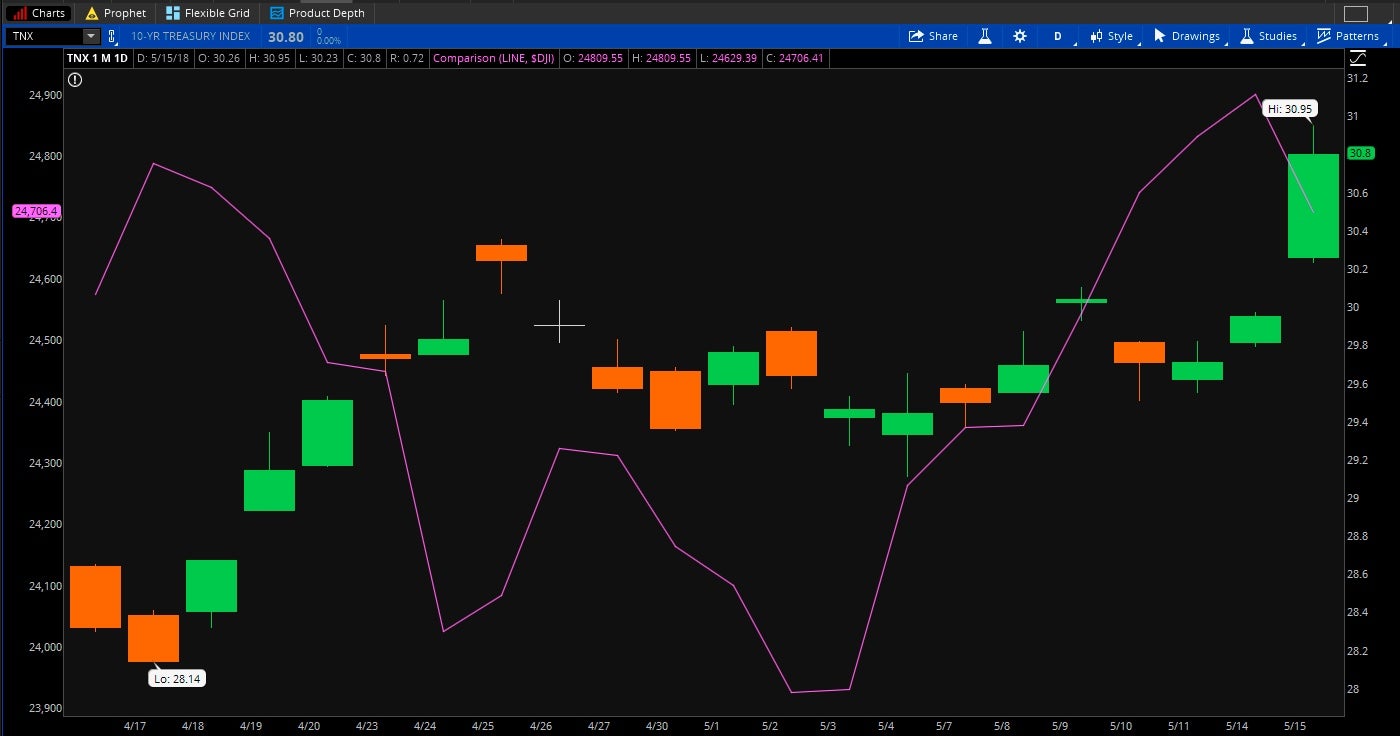Before the U.S. market opened, Macy's Inc. (NYSE: M) reported earnings per share of 48 cents on revenue of $5.5 billion. M was expected to
report adjusted EPS of $0.36, on revenue of $5.43 billion, according to third-party consensus estimates. The beat appears to offer
more evidence that the U.S. consumer is doing OK. It comes after news yesterday that U.S. retail sales rose for two consecutive
months.
In economic data this morning, April housing starts came in at 1.287 million units and building permits at 1.352
million units. Economists polled by Briefing.com were expecting April housing starts at 1.325 million units and building permits at
1.350 million units.
In geopolitical news, North Korea cancelled talks with South Korea and threatened to nix a meeting with President
Trump, saying it is displeased with U.S.-South Korea military exercises and U.S. demands that North Korea give up its nuclear
program.
Although there was good news for the economy yesterday — in the form of the retail sales news and an Empire State
manufacturing index that came in stronger than Wall Street analysts had expected — investors appeared to fret over inflation
implications.
The three major U.S. indices lost ground Tuesday, with the Dow Jones Industrial Average ($DJI) snapping an
8-session winning streak. The S&P 500 (SPX) did manage to close over 2700, pointing to some strength at that technical
level.
New High for 10-Year Treasury
The yield on the 10-year Treasury hit its highest point since 2011, weighing on stocks. Rising yields can make some
stocks appear less attractive, particularly those that pay dividends or are loaded with debt. Treasuries are considered a “safer”
investment by many, and rising yields raise the cost of borrowing. The 10-year Treasury yield rose 9 basis points to 3.08 percent
after topping 3.09 percent on Tuesday. It pulled back a bit this morning to just below 3.07 percent.
The rising yields may have helped the financial sector somewhat on Tuesday as higher rates often can improve profit
margins for banks. Financial stocks lost less ground than other sectors that were in the red. The action yesterday was a bit of a
head scratcher, and it may be worth watching how the sector performs if rates keep rising. (The energy sector was the only gainer
on Tuesday, but it rose only 0.01 percent.)
Earnings and Geopolitics
Retail earnings take center stage the remainder of the week, but aside from that it’s a little hard right now to
determine what sort of catalyst is out there that could give the market back some of the “giddy-up” it had last week. Unless the
retail earnings really surpass expectations in a big way, it might be difficult to figure out what the next instigator to the
upside might be. Thursday looks like a big day, with Walmart Inc. (NYSE: WMT) and J C Penney Company Inc. (NYSE: JCP) scheduled to report before the open and Nordstrom, Inc. (NYSE:
JWN) after the close. One question moving into these reports is
whether the recent strong retail sales data might have helped the retail sector beyond M.
Trade fears also weighed on markets Tuesday after Reuters reported that the U.S. ambassador to China said the
two countries remain “very far apart” on settling trade issues. Worries over the trade spat have dogged markets over concerns about
the ramifications for the economies of both countries.

FIGURE 1: YIELDS HELP END DJIA STREAK. The Dow Jones Industrial Average ($DJI, purple line) saw its win streak end
at eight yesterday as 10-year Treasury yields (candlestick) hopped to their highest level since 2011. Data source: S&P Dow
Jones Indices, CME Group. Chart source: The thinkorswim® platform from TD
Ameritrade. For illustrative purposes only. Past performance does not guarantee future results.
Inflation Watch Continues
Investors appear to be watching for clues as to whether the Fed will raise interest rates four times this year or
stick with three. We’ll get some insight into inflation Thursday with the Philadelphia Fed index, which shows what manufacturers
pay and the prices they receive. Economists polled by Briefing.com are expecting the index to drop to 20 from a prior reading of
23.2. Investors might want to consider watching what Fed funds futures do after the report is released. These financial instruments
on Tuesday afternoon were pricing in a 95 percent chance of a rate hike in June, a 74.8 percent chance of another hike in September
and a 42.9 percent chance for one in December.
Leading Indicators
A bit later in the day Thursday, we’ll get the Conference Board's Leading Economic Index for April. Economists polled
by Briefing.com are expecting the index to rise by 0.4 percent compared with a 0.3 percent rise in March. Each month the board
crunches a number of economic variables to calculate the index, so it can be a helpful snapshot for investors. Categories included
in the index touch on manufacturing, unemployment claims, stock prices, building permits and consumer expectations, among other
inputs.
Unemployment Reading
Considering job market tightness and what that might mean for inflation, it could be worth considering the weekly
unemployment figures. On Thursday, we’ll see the latest numbers. A consensus of economists polled by Briefing.com is expecting
initial claims for unemployment benefits to tick up to 216,000 from 211,000 the prior week. Although that would be an increase,
continuing claims have been at historically low levels.
Information from TDA is not intended to be investment advice or construed as a recommendation or endorsement of any
particular investment or investment strategy, and is for illustrative purposes only. Be sure to understand all risks involved with
each strategy, including commission costs, before attempting to place any trade.
© 2018 Benzinga.com. Benzinga does not provide investment advice. All rights reserved.